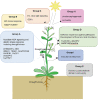Post-translational Modifications of bZIP Transcription Factors in Abscisic Acid Signaling and Drought Responses
- PMID: 34045920
- PMCID: PMC8142349
- DOI: 10.2174/1389202921999201130112116
Post-translational Modifications of bZIP Transcription Factors in Abscisic Acid Signaling and Drought Responses
Abstract
Under drought stress, plants have developed various mechanisms to survive in the reduced water supply, of which the regulation of stress-related gene expression is responsible for several transcription factors. The basic leucine zippers (bZIPs) are one of the largest and most diverse transcription factor families in plants. Among the 10 Arabidopsis bZIP groups, group A bZIP transcription factors function as a positive or negative regulator in ABA signal transduction and drought stress response. These bZIP transcription factors, which are involved in the drought response, have also been isolated in various plant species such as rice, pepper, potato, and maize. Recent studies have provided substantial evidence that many bZIP transcription factors undergo the post-translational modifications, through which the regulation of their activity or stability affects plant responses to various intracellular or extracellular stimuli. This review aims to address the modulation of the bZIP proteins in ABA signaling and drought responses through phosphorylation, ubiquitination and sumoylation.
Keywords: Abscisic acid; bZIP transcription factor; drought resistance; drought stress; gene expression; post-translational modification.
© 2021 Bentham Science Publishers.
Figures


Similar articles
-
Roles of pepper bZIP transcription factor CaATBZ1 and its interacting partner RING-type E3 ligase CaASRF1 in modulation of ABA signalling and drought tolerance.Plant J. 2019 Oct;100(2):399-410. doi: 10.1111/tpj.14451. Epub 2019 Jul 26. Plant J. 2019. PMID: 31278798
-
A pepper RING-type E3 ligase, CaASRF1, plays a positive role in drought tolerance via modulation of CaAIBZ1 stability.Plant J. 2019 Apr;98(1):5-18. doi: 10.1111/tpj.14191. Epub 2019 Jan 30. Plant J. 2019. PMID: 30548716
-
Ectopic expression of a hot pepper bZIP-like transcription factor in potato enhances drought tolerance without decreasing tuber yield.Plant Mol Biol. 2015 Nov;89(4-5):421-31. doi: 10.1007/s11103-015-0378-y. Epub 2015 Sep 22. Plant Mol Biol. 2015. PMID: 26394867
-
Abscisic-acid-dependent basic leucine zipper (bZIP) transcription factors in plant abiotic stress.Protoplasma. 2017 Jan;254(1):3-16. doi: 10.1007/s00709-015-0920-4. Epub 2015 Dec 15. Protoplasma. 2017. PMID: 26669319 Review.
-
Precise protein post-translational modifications modulate ABI5 activity.Trends Plant Sci. 2015 Sep;20(9):569-75. doi: 10.1016/j.tplants.2015.05.004. Epub 2015 Jun 1. Trends Plant Sci. 2015. PMID: 26044742 Review.
Cited by
-
miR2105 and the kinase OsSAPK10 co-regulate OsbZIP86 to mediate drought-induced ABA biosynthesis in rice.Plant Physiol. 2022 Jun 1;189(2):889-905. doi: 10.1093/plphys/kiac071. Plant Physiol. 2022. PMID: 35188194 Free PMC article.
-
Exploring the response of yellow lupine (Lupinus luteus L.) root to drought mediated by pathways related to phytohormones, lipid, and redox homeostasis.BMC Plant Biol. 2024 Nov 6;24(1):1049. doi: 10.1186/s12870-024-05748-4. BMC Plant Biol. 2024. PMID: 39506671 Free PMC article.
-
Genes, Genomes and Germplasm for Climate-Smart Agriculture- Part-I.Curr Genomics. 2021 Jan;22(1):2-3. doi: 10.2174/138920292201210412161326. Curr Genomics. 2021. PMID: 34045919 Free PMC article. No abstract available.
-
Plant Signaling Hormones and Transcription Factors: Key Regulators of Plant Responses to Growth, Development, and Stress.Plants (Basel). 2025 Mar 31;14(7):1070. doi: 10.3390/plants14071070. Plants (Basel). 2025. PMID: 40219138 Free PMC article. Review.
-
Overexpression of AtbZIP69 in transgenic wheat confers tolerance to nitrogen and drought stress.Planta. 2025 Jan 5;261(2):25. doi: 10.1007/s00425-024-04605-w. Planta. 2025. PMID: 39755999
References
-
- Fujita M., Fujita Y., Noutoshi Y., Takahashi F., Narusaka Y., Yamaguchi-Shinozaki K., Shinozaki K. Crosstalk between abiotic and biotic stress responses: a current view from the points of convergence in the stress signaling networks. Curr. Opin. Plant Biol. 2006;9(4):436–442. doi: 10.1016/j.pbi.2006.05.014. - DOI - PubMed
-
- Yoo C.Y., Pence H.E., Hasegawa P.M., Mickelbart M.V. Regulation of transpiration to improve crop water use. Crit. Rev. Plant Sci. 2009;28:410–431. doi: 10.1080/07352680903173175. - DOI
-
- Hummel I., Pantin F., Sulpice R., Piques M., Rolland G., Dauzat M., Christophe A., Pervent M., Bouteillé M., Stitt M., Gibon Y., Muller B. Arabidopsis plants acclimate to water deficit at low cost through changes of carbon usage: an integrated perspective using growth, metabolite, enzyme, and gene expression analysis. Plant Physiol. 2010;154(1):357–372. doi: 10.1104/pp.110.157008. - DOI - PMC - PubMed
Publication types
LinkOut - more resources
Full Text Sources
